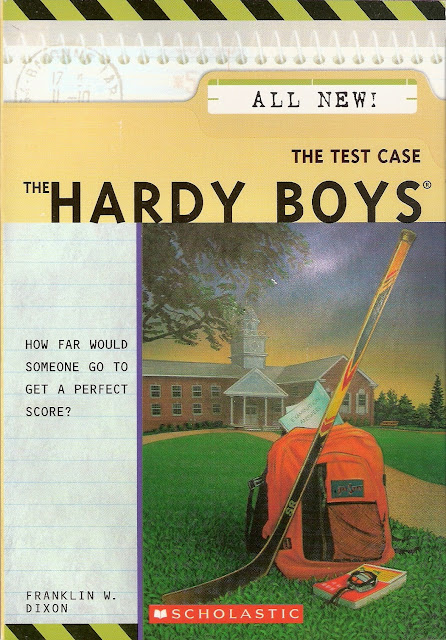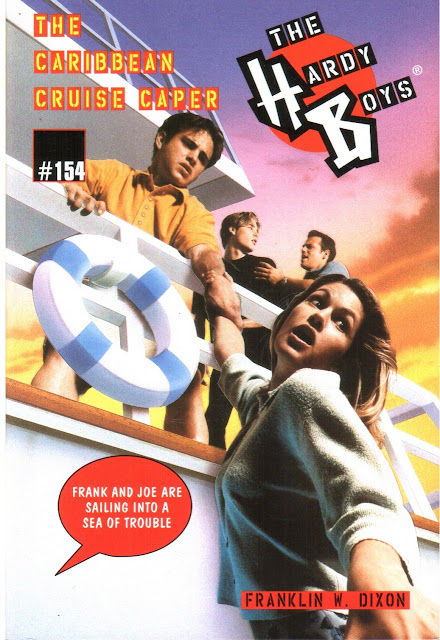 Plot: Tony Prito and Joe are suspended from Bayport High after being found with a copy of an upcoming state test, and the entire gang pitches in to clear their names.
Plot: Tony Prito and Joe are suspended from Bayport High after being found with a copy of an upcoming state test, and the entire gang pitches in to clear their names.
“Borrowing” from the past: At times, the book feels entirely retro; it starts with a skating party and a rousing game of crack the whip. They also play “monkey in the middle,” which seems a mildly offensive name for keep away. (I’m not sure to whom it would be offensive. Just feels that way. Wikipedia mentions the name is common in eastern Canada and New England.)
There’s also the old Bayport Times, which has been publishing since the ‘40s. (Bayport’s also seen the Banner (first mentioned in the 1930s), the Star (also the ‘30s), the News (1950s), and the Herald (1980s), but the Times seems the most durable.) Gertrude mentions people didn’t travel as much when she was growing up — and given that she grew up in the 19th century, that’s true. Fenton tells Frank and Joe to search his files for a criminal, which he often did in the old days — but now the files are password-protected databases rather than folders in a filing cabinet. Fenton gives out some of his patented advice, but this time it’s an old political saw rather than detective pointers, so it doesn’t really qualify. Frank uses a pay phone from inside the school; that’s positively antiquated.
One of Frank’s teachers cleverly tells him to solve crimes during summer vacation rather than the school year. That is the most used excuse for why the Hardys can gallivant around, solving crimes, but given how much summer vacation the boys used, they must have been crimefighting over several years.
On a more normal note, Frank uses his “martial arts training” at one point, and Joe thinks about a “martial arts class” — given the range that term covers, perhaps it’s the Hardys’ own art, kung kwankido jujudo, a devastating combination of ignorance and plot convenience. In actuality, Frank’s used jujitsu, judo, and karate. He also uses tai chi in this book; while tai chi is a real martial art, its popularity among seniors and those recovering from injury make it sound as ludicrous as when Batman used yoga to fight criminals in his early days.
Tony’s listed as a second baseman. He was listed as a second baseman in The Mummy Case (#63) but as a “hard-slugging” outfielder in Tic-Tac-Terror (#74). Second baseman seems right to me. He also played baseball with his friends on the beach in The Secret of Pirate’s Hill (#36).
Perhaps the most surprising is the return of Jerry Gilroy. Oh, he’s only “an outfielder named Jerry,” but I know who he is. Gilroy was one of the original Hardy Boys chums, a star outfielder who loved baseball so much he actually organized a summer league in Bayport (The Missing Chums #3). Try doing that today. But he gradually faded away because there was nothing unique about him — an athlete like Frank and Joe, a chowhound like Chet, etc. He was in eleven of the first twelve stories, then disappeared for more than a decade before popping up in The Melted Coins (#23), then wasn’t seen again. He was mostly edited out of the revised stories as well, although he pops up occasionally. But he’s back here. Yay, Jerry!
I will not have you acting as normal teenagers in my nostalgia!: Iola and Joe act somewhat … well … flirtatiously toward one another. I know, I know! It’s near impossible to believe, especially since they’ve been dating since the Hoover administration. But Iola steals Joe’s stocking cap at a skating party, giving Joe a “catch me if you can” sort of order, and when he does catch her, he … he … he lifts her up! Actual contact! Sure, it was through several layers of clothing, but if Iola hadn’t pulled the cap over Joe’s eyes, there might have been kissing next! Frank and Joe also hug their girlfriends after Bayport High wins a close hockey game; I think we can all agree that’s a rather thin rationalization for personal contact.
Sometimes, characterization is overrated: The chums get personalities in this book, which would normally be good. On the other hand, Biff is a moron, and Tony is suspicious the Hardys are trying to fit him for a frame, and Iola and Callie get to be girlfriends who fear for Frank and Joe in a fight. (Have you never seen them fight? They never get hurt — well, they don’t get hurt much.) On the other hand, Laura puts some crappy school administrators in their places, so it isn’t all bad.
Right: The kids worry a bad grade on State Achievement Battery will keep them out of the college of their choice. Sorry, no: as long as the topic of their admission essay is “How I Helped Fight Transnational Crime Before I Was Allowed to Vote,” I think most entrance boards will overlook a low score on some half-baked standardized test.
Do you know who you’re dealing with?: Laura complains the high school administration doesn’t even bother to inform her or Fenton of Joe’s suspension, and that’s probably the least objectionable part of the administration’s actions. They don’t check the test or boxes for fingerprints, and the school seems to launch no investigation at all, just sitting around waiting for everything to turn out all right. Futile, when you’re dealing with the Hardys. Laura gets the idea the principal wants everything to go away, and so he puts pressure on a couple of minors to sign false confessions. Laura threatens to hire a lawyer, which still prompts no response from the school, but the threat of Fenton donating his time to investigate the crime and everyone connected with the school would have made the principal wet himself. “You wouldn’t want that incident with the squirrel, the gasoline, and the comic books to get out, would you? Of course not.”
Just a normal day in the Hardy household: A hockey puck flies through the Hardys’ living room window, so Frank and Joe calmly clean up, get a piece of foam-core posterboard they have on hand, and tape it in place. Then they get milk and butterscotch raisin cookies from the kitchen. Nothing unusual here!
Opinions: There’s a lot to recommend this one. It has an old-school feel, it has a manageable scope, and it uses the supporting cast very well. That can’t be underestimated; part of the appeal of the older stories was how Frank and Joe had friends they could rely on. Here, Joe and Tony need friends very badly, and they come through for them. That’s part of what we remember high school as and what we want it to be.
On the other hand, there’s a lot of holes. The action scenes are often clunky at best and unbelievable at worst. (You try jumping onto a cart full of boxes rolling at you at high speed, and see if you can stay on.) The school administration is played as extremely stupid so the kids have a chance to investigate the crime. The lingo is occasionally laughable. (“Turkey”? “Straight stuff”? Really?) I think the capper is when Frank and Joe go to a sporting goods store to see if anyone remembers a guy who bought athletic socks on a Saturday. That seems … tenuous.
Grade: B+. The plotting and character use outweigh the dodgy stuff, because, hey, you expect the occasional plot hole and bad dialogue in a Hardy Boys book.
